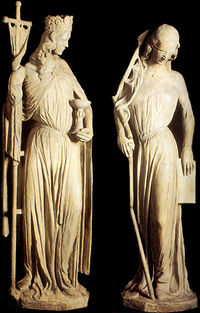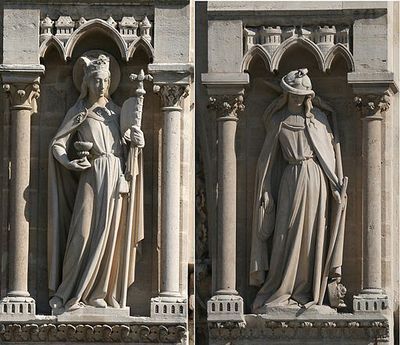Category:Parting of the Ways (subject)
Parting of the Ways
Overview
Judaism and Christianity
Judaism and Christianity are today two distinct monotheistic religions, both claiming origin from the ancient tradition of Israel.
The four main stages of development of Judaism:
- The Ancient polytheistic religion of Israel (up to the Babylonian Exile, 6th cent. BCE)
- Second Temple Judaism (a monotheistic religion centered around the Jerusalem Temple and ruled by priests, from the Babylonian exile up to the destruction of the Temple by the Romans in 70 CE and the desecration of the Temple Mountain after the Bar-Kokhba revolt in 134-135 CE).
- Rabbinic Judaism (which had its formative period up to the Muslin period, with the composition of the Mishnah, the Talmuds and the Midrashim, and the definition of the rabbinic canon of the Hebrew Bible. Rabbinic Judaism gradually became normative and divided in two main regional branches, Sephardic and Ashkenazi).
- Modern (post-Rabbinic) Judaism (after the French Revolution and the Emancipation [19th cent]) with the development of Reform, Conservative, Orthodox, Ultra-Orthodox, and Secular forms of Judaism. The Holocaust (1938-1945) and the creation of the State of Israel (in 1948) are two major events that have shaped this stage.
The five main stages of Development of Christianity:
- Nascent Christianity, as a minority religion in the Roman Empire (1st-3rd cent. CE)
- Christianity as the State religion of the Roman Empire in the 4th cent. (Edict of Constantine [Milan, 313 CE]; Edict of Theodosius [Thessalonica, 380 CE]). The definition of the Christian can of the Bible (Ancient and New Testament)
- The split between Western and Eastern Christianity (in the year 1054)
- The split within Western Christianity between Protestants and Roman Catholics (with the Reformation in the 16th cent.).
- Ecumenical Christianity (mid-20th cent onwards). Mutual recognition among the different Christian denominations and the beginning of inter-faith dialogue.
The Religious Models
The Confrontational Approach (Conflict)
Christianity and Judaism saw each other two different covenants, based on two separated revelations (Moses and Jesus).
From the Christian point of view, the "new" revelation was understood as the "true" revelation that superseded the "old" revelation--the Christians are those who "saw the light" while the Jews are "blind".
From the Jewish point of view, the "old" revelation was understood the only true revelation--the Jews are those who have remained faithful to the old religion and the Christians those who were led astray.
Paradoxically, the same model well served the interests of both traditions. Both Rabbinic Judaism and Christianity needed the assumption of Judaism as an unchanging, unchanged and unchangeable system, which the former (the Jews) claimed to have faithfully maintained over the centuries and the latter (the Christians) claimed to have faithfully transformed and fulfilled.
For oppressed Jews, the model served to emphasize their lasting fidelity to the tradition that Christians had betrayed.
Babylonian Talmud, Sanhedrin 43a -- On the [eve of the] Sabbath day of the Passover festival Yeshu of Nazareth was hanged. For forty days before execution took place, a herald went forth and cried: “Here is Yeshu of Nazareth, who is going forth to be stoned because he has practiced sorcery and enticed Israel to apostasy. Anyone who can say anything in his favor, let him come forth and plead on his behalf.” But since nothing was brought forth in his favor, he was hanged on the eve of Passover.
For triumphant Christians, the same model served to emphasize their being enlightened, while the Jews had remained "blind".
The Non-Confrontation Approach (Tolerance)
Jews and Christians agree to disagree, without questioning the reasons of the other. Live and let others live. Christianity and Judaism (and Islam) have nothing to do with each other. They cooperate as citizens to the welfare of their society, but no religious dialogue is possible.
The Inter-Faith Approach (Mutual Respect)
Both religions have a meaning for the other. All come from the same God.
Maimonides (12th-13th cent.): "Thanks to Christianity and Islam, Jewish monotheism has spread outside the boundaries of the Jewish people".
The Parable of the three rings.
- I have heard that there was once a wealthy man whose most prized possession was a precious ring. He bequeathed this ring to one of his sons, and by this sign, the latter was known as the head of family. Succeeding generations followed this tradition, with the principal heir always inheriting the cherished ring from his father. But, to make a long story short, the ring finally came into the possession of a man who had three sons, each the equal of the others in obedience, virtue, and worthiness. Unwilling to favor one son over the others, the father had a master artisan make two copies of the valued ring, and he bequeathed a ring to each son.
- Following the father's death, each son laid claim to the deceased man's title and estate, showing the inherited ring as proof. However, a careful inspection of the three rings could not reveal which of them was the authentic one, so the three sons' claims remain unresolved.
- The same is true with the three great religions, Judaism, Christianity, and Islam. The adherents of each religion consider themselves to be the legitimate heirs of God's truth. But as was the case with the rings, their claims too remain unresolved.
Three scholarly models
Scholarly research has completely demolished the idea of monolithic Judaism and Christianity and affirmed that Rabbinic Judaism was not the codification of the ancient tradition of Israel but emerged after the destruction of the Second Temple, at the same time as Christianity. Has also emphasize the internal diversity of both Judaism and Christianity,
Both diachronically and synchronically, there never was one Judaism and one Christianity, but a series of diverse groups (Judaisms and Christianities).
What is the relationship between Judaism and Christianity?
(1) The Ways that Always Parted.
Christianity and (Rabbinic) Judaism are two separate and self-sufficient religious systems. Any attempt to define a relationship between the two is useless.
"There is not now, and there never has been, a dialogue between the religions of Judaism and Christianity." (Jacob Neusner)
(2) The Parting of the Ways.
Judaism is an ever-developing religion, that has continuously reinvented itself in continuity with its past.
Christianity was born from Judaism and gradually parted, until it ceased to be Jewish and became a separate religion out of Judaism.
The relation between Jews and Christians is a father-son relation. The older brother (Judaism) has remained in the father's house while the younger brother left the house, either in obedience of God's will (according to the Christian point of view), or in disobedience of God's will (according to the Jewish point of view).
The historical problem is to understand when and why Christianity parted from Judaism and ceased to be Jewish. (James D.G. Dunn)
- The Parting of the Roads (1912 Foakes-Jackson), edited volume
- The Partings of the Ways between Christianity and Judaism (1991 Dunn), book
(3) The Ways that Never Parted.
Christianity and Rabbinic Judaism parted from each other, but never parted from their common roots. Christianity and Judaism are two parallel (and equally legitimate) developments of the ancient religion of Israel. Both of them are equally "new" and "old" because both of them preserved "old" elements of ancient Judaism and introduce "new" elements of innovation. It was not a father/son relation but a sibling relation.
The historical problem is to understand when and why Christianity and Rabbinic Judaism parted from each other, and became two separate religions.
- The Foundations of Judaism and Christianity (1960 Parkes), book
- Alan F. Segal, Rebecca's Children: Judaism and Christianity in the Roman World (1986 Segal), book
- Gabriele Boccaccini, Middle Judaism (1991 Boccaccini), book
- Annette Yoshiko Reed, The Ways That Never Parted (2003 Becker/Reed), edited volume
References
- Parting of the Ways / Annette Yoshiko Reed / In: The Eerdmans Dictionary of Early Judaism (2010 Collins / Harlow), edited volume, 1029-1031
External links
Pages in category "Parting of the Ways (subject)"
The following 31 pages are in this category, out of 31 total.
1
- Bibliotheca judaica antichristiana (Jewish Anti-Christian Literature / 1800 De Rossi), book
- Verus Israel: étude sur les relations entre chrétiens et juifs dans l'empire romain, 135-425 (1948 Simon), book
- El judaismo y el surgimiento del cristianismo: la bifurcación de los caminos = The Parting of the Ways: Judaism and the Rise of Christianity (1956 @1954 Cohen / Dujovne), book (Argentine ed.)
- Les routes divergentes: le Judaïsme et l'avènement du Christianisme = The Parting of the Ways: Judaism and the Rise of Christianity (1956 @1954 Cohen / Mandel), book (French ed.)
- Le judaïsme et le christianisme antique: d'Antiochus Epiphane à Constantin (1968 Simon/Benoît), book
- Men at the Crossroads between Jerusalem and Rome, Synagogue and Church (1970 Cohon), book
- Jews, Pagans, and Christians in Conflict (1982 Rokeah), book
- Les rabbins et les premiers chrétiens: archéologie et histoire (1984 Meyers, Strange / Prignaud), book (French ed.)
- Le judaïsm à l'aube du christianisme (1986 Neusner / Bagot), book (French ed.)
- Siblings: Rabbinic Judaism and Early Christianity at Their Beginnings (1989 Perelmuter), book
- Jews and Christians: The Myth of a Common Tradition (1991 Neusner), book
- Christianity and Rabbinic Judaism: A Parallel History of Their Origins and Early Development (1992 Shanks), edited volume
- Images of Judaism in Luke-Acts (1992 Tyson), book
- Il medio giudaismo = Middle Judaism (1993 @1991 Boccaccini), book (Italian ed.)
- Schismatics, Sectarians, Dissidents, Deviants (1993 Sanders), book
- Religion & Power: Pagans, Jews, and Christians in the Greek East (1996 Edwards), book
- The Struggle for Scripture and Covenant: The Epistle of Barnabas and Jewish-Christian Competition in the Second Century (1996 Hvalvik), book
- Le déchirement: juifs et chrétiens au premier siècle (1996 Marguerat), edited volume
- Ο Xριστιανισμός έναντι Iουδαϊσμού και Eλληνισμού κατά το Β ́ αι. μ.Χ (1997 Agouridis), book
2
- The Ways That Never Parted (2003 Becker/Reed), edited volume
- The Formation of Christianity in Antioch (2003 Zetterholm), book
- The Reluctant Parting: How the New Testament's Jewish Writers Created a Christian Book (2005 Galambush), book
- Giudei e cristiani nel I secolo (2006 Durante Mangoni, Jossa), edited volume
- The Exegetical Encounter Between Jews and Christians in Late Antiquity (2009 Grypeou, Spurling), edited volume
- Ignatius of Antioch and the Parting of the Ways (2009 Robinson), book
- The Fiscus Judaicus and the Parting of the Ways (2010 Heemstra), book
- Jews, Christians and Jewish Christians in Antiquity (2010 Paget), book
- Brothers Estranged: Heresy, Christianity, and Jewish Identity in Late Antiquity (2010 Schremer), book
- Dallo stesso grembo. Le origini del cristianesimo e del giudaismo rabbinico (2012 Boccaccini, Stefani), book
- Espacios fronterizos: Judaísmo y cristianismo en la Antigüedad tardía = Border Lines: The Partition of Judaeo-Christianity (2013 Boyarin / Segovia), book (Spanish ed.)
- Socratic Torah: Non-Jews in Rabbinic Intellectual Culture (2013 Labendz), book
Media in category "Parting of the Ways (subject)"
The following 17 files are in this category, out of 17 total.
- 1912 Foakes-Jackson.jpg 324 × 499; 18 KB
- 1934 * Parkes.jpg 320 × 499; 24 KB
- 1954 * Cohen.jpg 348 × 499; 31 KB
- 1960 * Parkes.jpg 337 × 499; 22 KB
- 1969 * Sandmel.jpg 331 × 499; 35 KB
- 1986 * Segal.jpg 323 × 499; 19 KB
- 1988 Porton.jpg 333 × 499; 14 KB
- 1991 * Boccaccini.jpg 332 × 499; 32 KB
- 1991 * Dunn.jpg 375 × 499; 38 KB
- 1994 Setzer.jpg 324 × 499; 38 KB
- 1995 Taylor.jpg 180 × 284; 7 KB
- 1999 * Boyarin.jpg 333 × 499; 34 KB
- 2002 * Skarsaune.jpg 333 × 499; 24 KB
- 2004 * Boyarin.jpg 329 × 499; 42 KB
- 2008-T Boyarin it.jpg 298 × 499; 22 KB
- 2012 * Schafer.jpg 322 × 499; 26 KB
- 2020 Garcia Huidobro.jpg 331 × 499; 34 KB


















